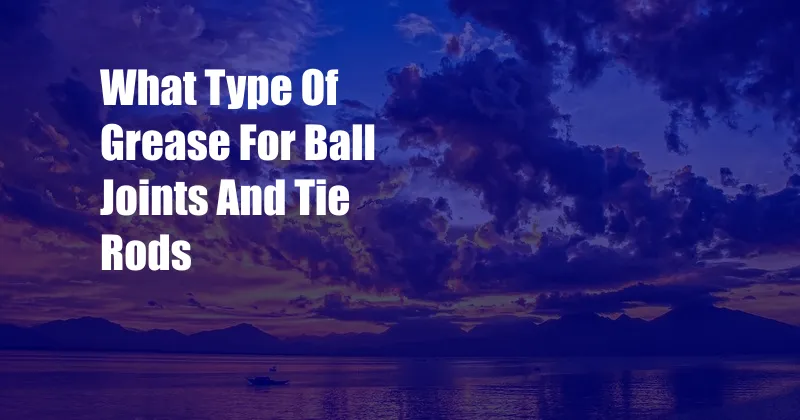
## What Type of Grease for Ball Joints and Tie Rods?
Introduction
Your car’s suspension system is essential for a smooth and safe ride. Ball joints and tie rods are two critical components of this system, and they need to be properly lubricated to function correctly. But what type of grease should you use for these parts? Using the wrong grease can damage your suspension system and lead to expensive repairs.
Understanding Ball Joints and Tie Rods
Ball joints allow the wheels to move up and down while steering. They are located at the end of the control arms and are connected to the steering knuckles. Tie rods connect the steering rack to the steering knuckles and allow you to turn the wheels.
The Importance of Lubrication
Ball joints and tie rods need to be lubricated to reduce friction and wear. Without lubrication, these parts will quickly become damaged, leading to suspension problems.
Choosing the Right Grease
The type of grease you use for ball joints and tie rods is crucial. Not all greases are created equal, and some can even damage these parts. The best choice is a lithium-based grease that is specifically formulated for automotive use. Lithium-based grease is resistant to water and heat, and it will not damage the rubber boots that protect the ball joints and tie rods.
Applying the Grease
When applying grease to ball joints and tie rods, it is essential to follow the manufacturer’s instructions. Generally, you will need to remove the old grease and apply a new layer to the contact surfaces. Be sure to use a grease gun to apply the grease evenly.
Tips and Expert Advice
Here are some tips for greasing ball joints and tie rods:
- Use a high-quality lithium-based grease that is specifically formulated for automotive use.
- Follow the manufacturer’s instructions when applying the grease.
- Be sure to remove all of the old grease before applying new grease.
- Apply the grease evenly to all of the contact surfaces.
- Avoid over-greasing, as this can damage the rubber boots.
General FAQ on Ball Joints and Tie Rods
Q: How often should I grease my ball joints and tie rods?
A: You should grease your ball joints and tie rods every 12,000 to 15,000 miles.
Q: What are the signs of bad ball joints?
A: The signs of bad ball joints include clunking noises, steering problems, and uneven tire wear.
Q: What are the signs of bad tie rods?
A: The signs of bad tie rods include vibration, steering problems, and uneven tire wear.
Conclusion
Ball joints and tie rods are critical components of your car’s suspension system. By properly lubricating these parts, you can help extend their life and improve the performance of your car. If you are not sure how to grease ball joints and tie rods, it is always best to consult with a qualified mechanic.